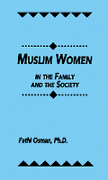| E-mail sis@sisfora.po.my | Tel 603-2426121, 2483705 | Fax 603-2483601 | |
| About SIS | Issues & Themes | Resources | Programmes & Events | Links | Home | |
Muslim Women in the Family Society
This book contains Professor Fathi Osman's enlightend interpretation on verses in the Qur'an on women and women's rights. It is divided into 23 different topics, which include:
- Equal from Their Origin
- Love and Tenderness
- Marriage
- Rights of Divorced Women
- Monogamy, not Polygamy
- Modesty, not Segregation
- Responsibility, not Superiority
Prologue: A Development of Awareness
The distressing picture of men-women relations in contemporary Muslim societies, which contradicts the teachings of Islam, is a concrete fact that cannot be denied. However, another positive fact that exists side by side is that an awareness of the essential and constructive role of women in the society to fulfil their Islamic responsibilities, is increasingly appreciated among Muslim men and women.
The divine guidance in the Qur'an and Sunna, and many positives in our intellectual and practical heritage, have increasingly inspired and generated new works that advocates the rights of Muslim women in the name of God and God's message.
Day after day, Muslims are becoming more and more aware of the due distinction between the permanent teachings of the divine sources of Islam and the accumulated human ideas and practices that were influenced by the cultural and social circumstances in the Muslim societies, in the past and the present. Conceptual and behavioural progress is apparent now in Muslim societies, which seems more keen to observe the divine teachings and abandon the human deviated customs in man-woman relations in the family and the society. Women's education and work in different fields have developed their personality, self confidence and initiatives. An awareness of the Islamic rights and responsibilities has inspired many of them to be committed to the Islamic message of justice, peace and prosperity. These concrete developments have provided a support for the Muslim woman, stronger than any philosphical or legal arguement. On the other hand, Muslim men have realised the social change and have become more inclined to deal with it. Muslims cannot reactivate their societies, secure a positive role in the contemporary world and get their message heard by all peoples, while half of their population is supressed or neglected. How can Muslims call universally for divine justice, while they are missing or ignoring it among themselves, their homes and their communities?
Progress can be obviously noticed...and hopefully it will continue and accelerate, benefiting Muslims in the first place, and then representing the message of Islam to the whole world appealingly.
About the Author
Fathi Osman is a distinguished Islamic scholar who has taught in several universities all over the world including the Al-Azhar University, Egypt. He was also a Visiting Professor at the International Islamic University in Kuala Lumpur. In addition to his contribution to modern Islamic thinking in arabic, Dr Osman was Editor-in-Chief of the international Islamic magazine, Arabia: The Islamic World Review from 1981-1987. His publications in English include Shari'a in Contemporary Society: The Dynamics of Change in the Islamic Law, The Concept of the Qur'an: A Topical Reading of the Divine Message, Jihad: A Legitimate Struggle for Human Rights, In Fraternity: A Message to Muslims in America, (co-authored) The Muslim Women in the Family and Society. He has been actively involved in interfaith dialogue.
|
| "The Qur'anic verse: 'Men shall take care of women with what God has bestowed on the former...(Al Nisa', 4:34) does not state a 'superiority' of man over woman, rather it explains the 'responsibility' of a man for sustaining the family. Since the woman is phycially restricted from earning a living during the lates stage of her pregnancy and the first year or more of her child's life, it is essential to show who is responsible for supporting the wife, mother and the children. The Qur'an says: '...and it is incumbent upon him who has begotten the child to provide fairly for their (mother and child) sustenance and clothing ...' (Al Baqarah, 2:233). This is the 'care' that is mentioned in the previous verse of the Qur'an (4:34). In arabic, the verb qama with the preposition 'ala means 'take care of'. The man has to carry on his responsibility of providing the sustenance of his divorced wife during a certain waiting period (Al Talaq, 65:6-7), as it has been mentioned earlier. But, this responsibility of taking care of qawama, is within the family as the Qur'anic verse shows clearly, and cannot be extended to be a general rule in the whole society...When a man does not work and cannot secure for himself and his family a decent living for any reason, he cannot assume qawama just because he is related to the gender of men...Each believer - male and female - has to observe the divine teachings in mutual relations, whether one may be more or less powerful. This is the difference between a God-consious society and a jungle of selfish materialists." ( pp. 47-48) |
Copyrightę 2000 SIS Forum (Malaysia) Sdn Bhd. All rights reserved. JKR No. 851, Jalan Dewan Bahasa, 50460 Kuala Lumpur, Malaysia.
